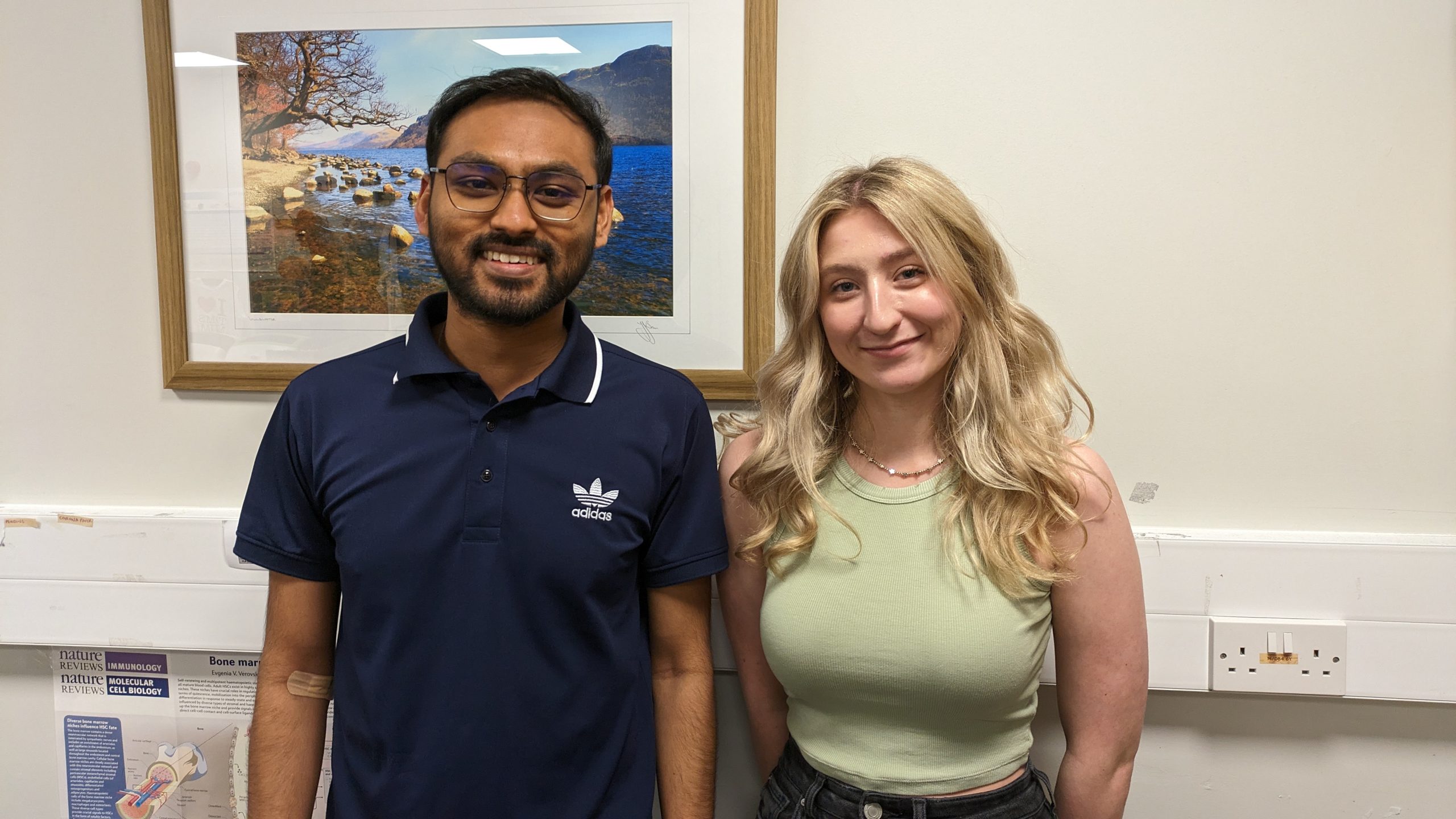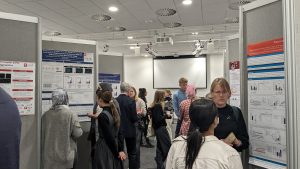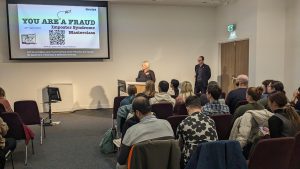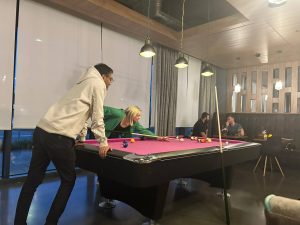Aberdeen Meeting – ECR day report

Platelet Society ECR day, Aberdeen 2024: Masters Students’ perspective
Vairavan Nanda Gopalan (VNG). University of Birmingham
Sophie Smith (SS). University of Birmingham
Reflective Overview of the main meeting
SS: It truly was a tremendous pleasure to be invited to attend the Platelet Society’s annual conference, hosted in Aberdeen. This multi-day event was very much an enlightening and certainly inspiring experience. I felt very honoured to be invited as a master’s student, as this was a fantastic opportunity to network with both early career researchers (ECRs) and further established professionals from a diverse range of backgrounds. I returned home from this event with a deepened passion for my own research, an increased level of inspiration to personally strive in this research area, and a future desire to attend a similar event in the future but as a speaker/presenter.
VNG: Attending the Annual Platelet Society Meeting in Aberdeen was an eye-opening experience. As a master’s student, this event was a perfect opportunity to delve deeper into the world of platelet research, network with peers, and learn from seasoned professionals. The ECR day was filled with enlightening sessions and invaluable interactions that broadened my understanding of the field and offered a fresh perspective on my career path.
ECR day: Oral presentations and posters
 The ECR day kicked off with flash-talk presentations from 8 ECRs. This session was specifically designed for budding scientists, mostly PhD students, who presented their cutting-edge research on platelets. These talks were followed by a poster session, where ECRs could browse fellow ECRs posters in a relaxed environment allowing for smaller open discussions.
The ECR day kicked off with flash-talk presentations from 8 ECRs. This session was specifically designed for budding scientists, mostly PhD students, who presented their cutting-edge research on platelets. These talks were followed by a poster session, where ECRs could browse fellow ECRs posters in a relaxed environment allowing for smaller open discussions.
VNG: Listening to these presentations was truly inspiring. Each researcher shared their unique findings, showcasing the diverse range of studies being conducted in platelet research. From molecular mechanisms to clinical applications. As a Master’s student, I didn’t have the chance to present my work or create a poster as I was still very early into my research. However, I found myself wishing I had. Presenting my research would have been an excellent opportunity to receive feedback from experts and peers alike. Nevertheless, the experience of simply attending was enriching. It gave me a clearer picture of the challenges in platelet research, significantly widening my horizon.
SS: As the ECR day was tailored towards ECRs, the majority of presenters were PhD students, therefore the environment didn’t feel too intimidating to me, and it was comforting to discuss with these students about their specific academic journeys that lead them to platelet research. The students were presenting their studies that covered a broad range of topics within platelet research. The students took time to highlight their key results and how this correlated to their research questions and hypotheses, they also addressed the struggles and challenges they personally faced as their research advanced during the course of their studies. Despite not presenting myself, I can appreciate how this experience is enriching and enlightening for PhD students, as it proved to be a relaxed opportunity to promote ideas and build on self-confidence. As this session concluded, I left with an increased awareness of the demands and satisfactions of platelet research, as well as a heightened understanding of the scope of research conducted in this field.
Wellbeing Session and ‘Imposter Phenomenon’ by Dr Marc Reid 
The afternoon session started with a focus on wellbeing. We were treated to a captivating talk by Dr Marc Reid (University of Strathclyde, https://www.dr-marc-reid.com/) on the imposter phenomenon, where he discussed pervasive feelings of inadequacy are among researchers, particularly early career ones. This session was highly captivating as the audience was kept engaged through quizzes and relatable anecdotes.
SS: Dr Marc Reid presented a truly invaluable and a much-appreciated talk focusing on ‘Imposter Syndrome/phenomenon’. It was clear that Dr Reid is very passionate about sharing awareness of this feeling of Imposter Syndrome. I personally felt very grateful that Dr Reid devoted his time to host this session. This talk was extremely validating to hear, especially as a master’s student who constantly feels lesser than those surrounding me. It was reassuring in a bittersweet way that the majority of the ECR audience agreed that they too felt inferior, lacking self-confidence, and struggling to even grasp the enormity of their own achievements or acknowledge their talents and skills. This session is one that I am sure I will reflect on in my years to come, as whilst Dr Reid designed this talk with the focus of science and academia in mind, it is applicable to many aspects of life and so for that I am thankful to have been in attendance.
VNG: Dr. Reid’s roadmap for overcoming imposter syndrome was both practical and reassuring. He emphasized building self-confidence, seeking mentorship, and acknowledging our own accomplishments. Though his talk wasn’t directly about career options in platelet research, it was incredibly relevant. The interactive session, complete with quizzes and discussions, was engaging and left us all feeling a bit more empowered.
Career talks: Academia, industry, and beyond
The afternoon was dedicated to career talks, a highlight for many of the ECRs. The ECRs were each granted the opportunity to select which talks they would prefer to attend. They could choose to hear about a range of career prospects, spanning academia to industry and also how to start a career in medical writing or as a patent attorney. These smaller talks allowed for more open and honest discussions with the speakers, as they shared their personal background and academic journeys.
 SS: Before the ECR day, I had not much considered careers outside of academia, so I took it upon myself to explore other opportunities such as in industry. After these talks concluded, I felt as though I had broadened my horizons, but not overwhelmingly so. I felt uplifted in knowing that I have chosen valuable degrees to study, and that there truly are many career avenues of which I have the skillset to navigate.
SS: Before the ECR day, I had not much considered careers outside of academia, so I took it upon myself to explore other opportunities such as in industry. After these talks concluded, I felt as though I had broadened my horizons, but not overwhelmingly so. I felt uplifted in knowing that I have chosen valuable degrees to study, and that there truly are many career avenues of which I have the skillset to navigate.
VNG: We had the freedom to choose from various sessions held simultaneously in smaller rooms, fostering a more interactive environment. The speakers were a diverse group, ranging from academics to industry entrepreneurs. They shared their career journeys, decisions they had made along the way, and insights into the different paths available in the research field.
One of the most valuable aspects of these sessions was the opportunity to ask questions. The interactive format allowed for an open dialogue, where we could delve deeper into specific topics and get personalized advice. These talks were not only informative but also inspiring. They highlighted the multitude of career options available and provided a roadmap for navigating our professional futures.
Prize giving and Networking
The day concluded with a prize-giving ceremony for the best oral presentations, which was won by Justin Trory from the University of Bristol. This was followed by a networking session, where ECRs could exchange ideas, discuss research, and forged new connections that could potentially lead to future collaborations.
VNG: Overall, my experience at the Annual Platelet Society Meeting ECR day was wonderful. It was a day packed with learning, inspiration, and meaningful interactions. The diversity of research being conducted in the field is truly impressive, and understanding the various career options available was enlightening. The sessions on imposter syndrome and career paths were particularly impactful, providing both practical advice and emotional support. I thoroughly enjoyed the day and am grateful for the opportunity to connect with so many talented researchers.

